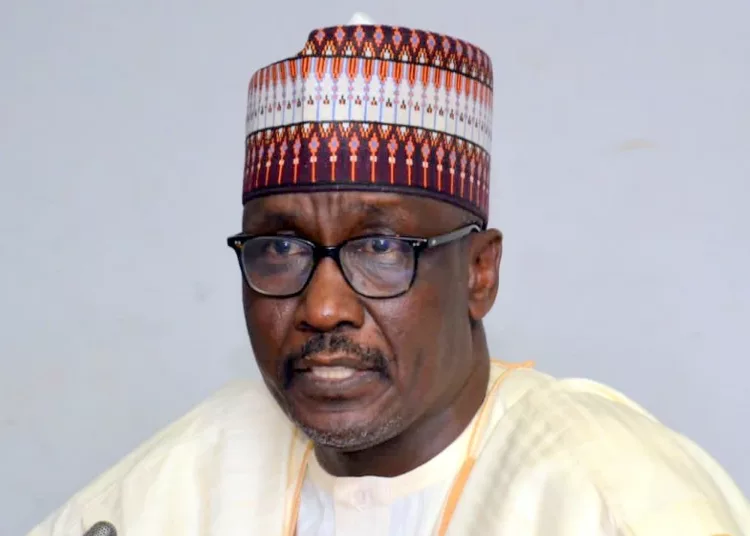As part of plans to raise Nigeria’s oil production output from the current 1.6million barrels per day (mbpd) to 3mbpd, the group chief executive officer of Nigerian National Petroleum Company Limited (NNPCL), Malam Mele Kyari, has stressed the need to invest in women to as a way of increasing the critical workforce of the oil and gas industry.
The NNPCL boss made this known during the 2024 Women in Energy, Oil and Gas (WEOG) Leadership Summit in Abuja, which has the theme: ‘Closing Energy Gaps in Nigeria by Investing in Women’.
The summit, which was organised by WEOG Nigeria in commemoration of the International Women’s Day observed annually on March 8, was hosted by the Petroleum Technology Development Fund (PTDF).
Kyari stressed the need to increase the nation’s refining capacity to over 1mbpd, expand NNPCL retail outlets to over 1,500 stations across sub-Saharan Africa, and monetise the nation’s vast gas resources, among others.
Kyari said in the period in sight, the state-owned company will grow its renewable energy portfolio and optimise payment of dividends to shareholders.
He said, “Looking ahead to the next decade, we envision a Nigeria propelled by the oil and gas industry: monetization of our vast 203 Tcf gas resources, increasing crude oil production to 3 mbpd, raising domestic refining capacity to over 1 mbpd, expanding our retail network to over 1,500 stations across sub-Saharan Africa, growing our renewable energy portfolio, and optimizing dividend pay-outs to shareholders.
“One of the most powerful strategies at the company’s disposal is investing in women.”
According to him, women constitute a substantial portion of Nigeria’s population and workforce, yet they remain underrepresented in the energy sector.
The GCEO said NNPCL has audacious goals and accomplishing them required a multifaceted approach.
Kyari said as “at Q4 2023, women represented 18.6 per cent of our total workforce and 23.1 per cent of our leadership.
“This is largely attributed to the low level of participation in Science, Technology, Engineering and Mathematics fields which is the major channel for our work force in the oil and gas industry.
“Studies have also shown that at the middle of the technical talent pipeline (which is middle to senior management levels), there is lagging progress for women which is greatly impacted by the degree of flexibility of work.”
He said at NNPCL, the company has evaluated the challenges faced by women across different levels of its workforce and taken additional steps to address them
He added that NNPCL focuses on several key strategic initiatives. According to him, from coaching and mentoring to ensure our managers are effective leaders; to unlocking the full potential of flexible work.
Kyari said by empowering women and providing them with equal opportunities, NNPCL can unlock immense potential and drive meaningful change across the energy landscape.
He noted that “We are committed to fostering a culture of inclusivity and empowerment, where women have equal access to opportunities for growth, advancement, and leadership.
“Through initiatives such as mentorship programs and leadership training, we are actively working to build a more diverse and resilient workforce.
“Investing in women means more than just increasing gender diversity; it means recognisng and harnessing the unique talents, perspectives, and capabilities that women bring to the table.
“From engineering and technology to leadership and management, women have proven time and again their ability to excel in every aspect of the energy sector.”In his remarks, the executive secretary of PTDF, Ahmed Aminu, commended the women in the energy sector for consistently breaking barriers and making significant contributions.
This, Aminu said was leading to positive change in various aspects of the oil and gas industry.
Speaking, the WEOG National President, Dr. Oladunni Owo, said the association aligned with the International Women’s Day to celebrate the women in energy.
She recalled that March 8, 1908, women workers marched through New York City protesting child labour and working conditions demanding women’s suffrage.
According to her, beginning in 1910, March 8 became annually observed as International Women’s Day.
Owo said the International Women’s Day amalgamated into International Women’s month and concluded as a period when women are recognized for their achievements without regard to divisions, whether national, ethnic, linguistic, cultural, economic or political. IWD has assumed a new global dimension for women in developed and developing countries alike.
On the significance, she said in 2015 during a IWD celebration in the UK, East London – Folasade Bright , it was a mixed race congregation of professional women from different races and industries.
The president added that “We signed a DEI Charter and was charged to ensure DEI happens in our different industries . Hence annual IWD celebration was on the charter of WEOG right from inception and formative days.”
She said for “WEOG the IWD goes beyond just celebration to transformation , we take every theme and hashtag very serious , infusing same into our Yearly theme, industry and national focus at large. I will like to admonish every organisation and individual represented here to make IWD month a month to review your commitment to DEI, your commitment to maximising the entirety of your human resources , tap into the untapped reserve as a strategy for progress and sustainability.”
The highlight of the occasion was the presentation of awards to some dignitaries and conferment of Grand Ambassador Awards to the Minister of State Petroleum Resources (Oil), Sen. Heineken Lokpobiri and his counterpart, Mr Ekperikpe Ekpo (Gas).
Other recipients were Malam Mele Kyari, GCEO, NNPC Ltd., Mr Farouk Ahmed, Authority Chief Executive, Nigerian Midstream and Downstream Petroleum Regulatory Authority (NMDPRA) and Mr Gbenga Komolafe, Commission Chief Executive, Nigerian Upstream Petroleum Regulatory Commission (NUPRC), among others.





